How are your family relationships? Thinking about how to resolve family conflict?
You may be wondering:
Is family therapy helpful?
Does family counseling really work?
What can family therapy treat?
First off, let’s acknowledge that family problems are part of being human.
And, since all families are made up of individuals who each have their own personalities and struggles, conflict is bound to arise.
Does family therapy really work?
To help navigate life’s changes and challenges and to resolve conflict, sometimes individual family members and the family unit could benefit from the guidance and support of a family therapist.
A family counselor can help create a safe space for family issues to be addressed.
Family therapy can be helpful for conflict resolution and behavioral issues.
And, even if things are currently going great in your household—for example, everyone is getting along well, and there are no specific problems to address—your family relationships can still benefit from the communication tools you’ll all learn in family counseling.
A family counselor can create a safe space for family conflicts to be resolved.
Read on to find out the goals of family therapy and the benefits of family therapy.
Plus, if you think your family might benefit from family counseling and you’re wondering: “How can I find family therapy near me?”—we’ve got you covered with helpful links to family counselors near you who are accepting new clients.

What is the purpose of family therapy?
A family therapist views the family as a unit, working to treat the familial relationships as a whole.
Family therapy can treat a wide range of problems, according to the American Association for Marriage and Family Therapy (AAMFT):
Marital problems
Individual psychological problems
Child-parent problems
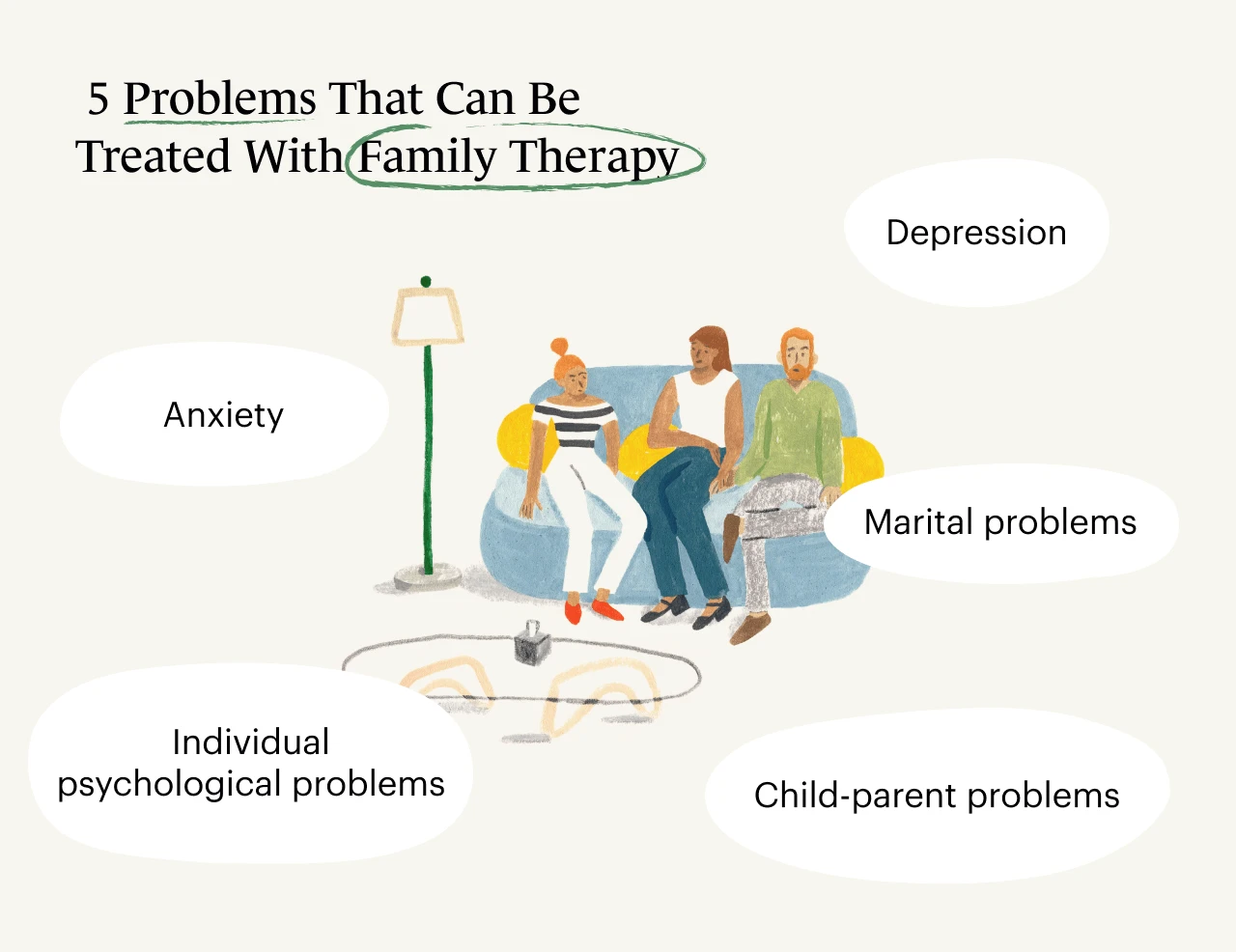
Any individual, or multiple people in the family, may be experiencing any of the problems mentioned above.
As a 2020 study points out, family counseling can either help inform the unit about specific disorders—such as addiction or mental illness—or address conflict and behavior patterns within the family.
According to therapist Ellen Biros, MS, LCSW, C-PD, a common myth is that if there are no specific problems to address, your family may not benefit from family therapy.
“Whether family or individual therapy, discussing life with someone who has a third party objective viewpoint, as well as therapeutic skills, can always be helpful,” says Biros.
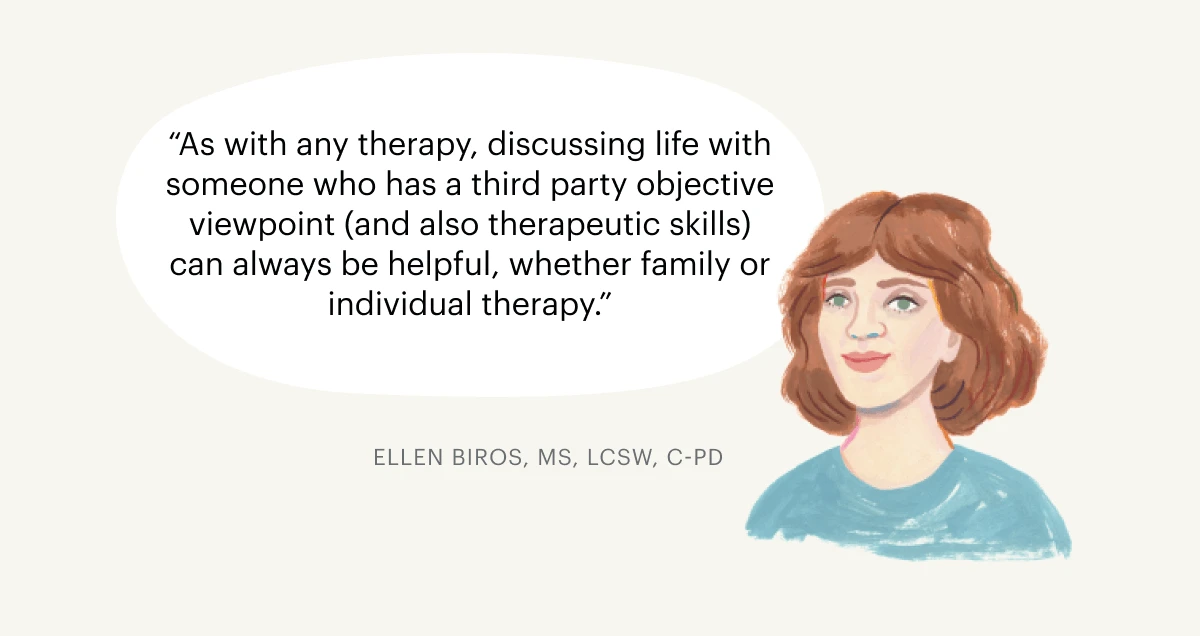
Who does family therapy help?
Because family counseling does not focus on one individual but rather the family as a unit, each member can ultimately benefit from the therapy.
While the entire family is involved, there is often an “identified patient”—such as a child who may have mental illness—who is being treated with therapy that involves the entire family.
Similarly, if the family is going to counseling because of a parent’s substance abuse, that parent would be the identified patient.
A common myth is that if there are no specific problems to address, your family may not benefit from family therapy.
For example, a 2019 study published in the International Journal of Environmental Research and Public Health found that even when structural-strategic therapy is sought out because of an adolescent, there is usefulness for “family, dyadic, and individual facets.”
This means that not only will the adolescent benefit from family members learning how their behaviors help or harm, other individuals (such as siblings and parents) in the family benefit as well.
Family therapy can benefit families of all ages, whether there are young children or everyone in the family is now an adult.
Therapist Jessica Tang, MS, LMFT, vice president of Caldwell Family Institute, says that when young children are involved, their behavior can actually be an indicator of family issues.
Family therapy can benefit families of all ages, whether there are young children or everyone in the family is now an adult.
“First of all, families should know that their children act as the ‘check engine’ light for the larger family,” explains Tang.
“Children suffering from any number of challenges—from depression to anxiety to acting out to shutting down—benefit from family therapy," she says, "because the child's ‘symptom’ is often simply a signal of a much larger problematic dynamic in the family.”
Tang points out family therapists don’t believe in treating a child individually, and they often view individual child therapy as yielding little change.
“Family therapy is a much quicker, more effective way to shine light on what's really going on to cause these symptoms in a child,” she says.
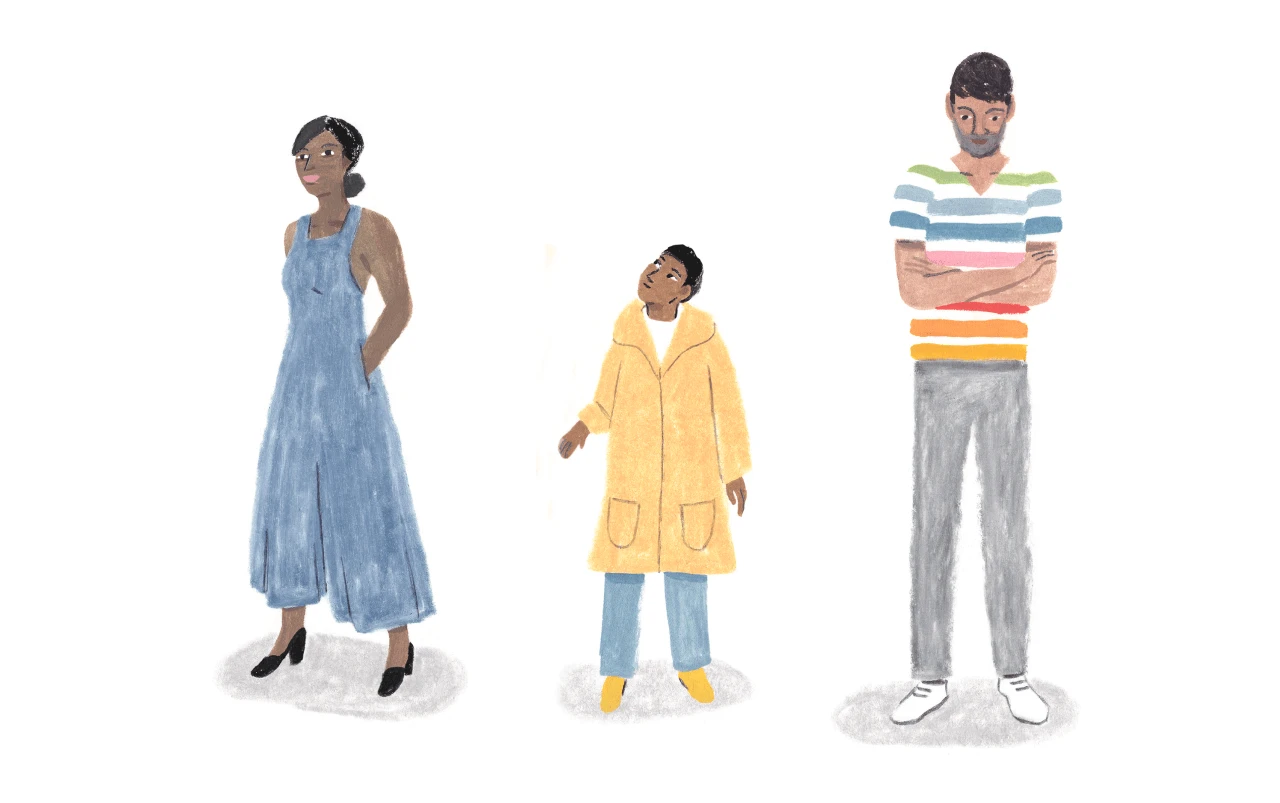
It should be noted that family therapy isn’t just for members of a family living under the same roof.
According to Tang, in families now composed entirely of adults, if any members are no longer speaking, are having issues adapting to natural changes—new children or in-laws, for example—or if an elder is reaching end of life, family therapy can also be beneficial.
It should be noted that family therapy isn’t just for members of a family living under the same roof.
“Adult relationships have an added layer of complexity in that everyone, from a developmental standpoint, is on an even playing field,” she says. ”Parents have to make a massive adjustment in the way they understand, interact with, and form expectations of their now-adult children.”
The Substance Abuse and Mental Health Services Administration (SAMHSA) notes that therapists will often ask the identified patient who they consider to be a member of their family and invite or include those individuals.
Thus, attendance may be open to in-laws, stepfamilies, extended family members, mentors and more.
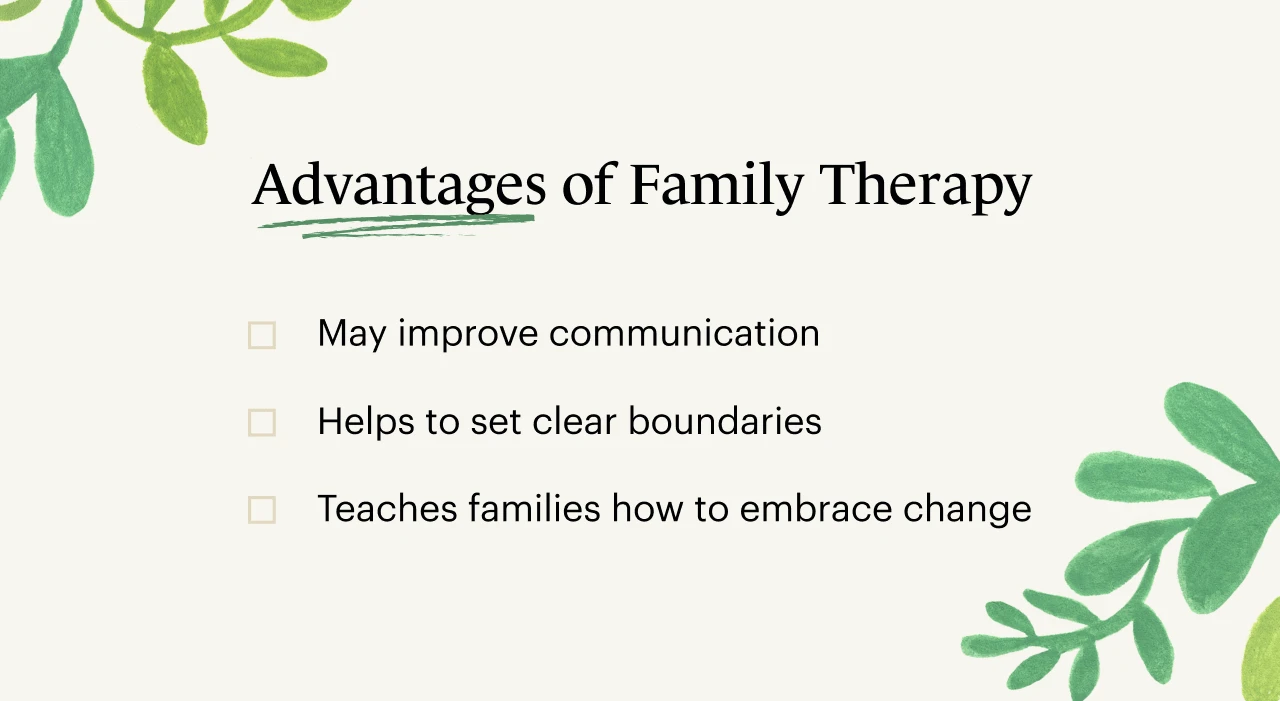
What are the goals of family therapy and the benefits?
1. Family therapy may improve communication
As the goal of family therapy is to help families navigate how each individual plays a role in the wellbeing of the whole unit, communication may improve.
However, this can only happen through collaboration of each member.
If the attending family members are not engaged in the family therapy sessions, the outcome may not be as successful.
Researchers point out that guarded families can cause issues for a family counselor.
“Therapy as a whole is contingent on the idea that change is necessary, and family therapy—much like individual or couples therapy—does run into the barrier of client willingness and openness to change,” says therapist Angela Caldwell, MFT, founder and president of Caldwell Family Institute based in Los Angeles.
If the attending family members are not engaged in the family therapy sessions, the outcome may not be as successful.
“What we think is awesome about relational therapy, whether family or couples therapy, is that one member of the family can make a huge impact on the rest of the family system,” she says.
In addition to ensuring an openness and willingness to change among the family members, Caldwell points out that when there is an individual in the family dealing with a personality disorder, eating disorder and/or substance disorder, those challenges may require individualized attention before family therapy begins.
“If a family member does decide in the middle of therapy that they’re no longer interested in attending, most likely the therapist would discuss with them why they want to stop participating,” adds Biros.
“This can be done, either with the other family members present or individually depending on the family member,” Biros says. ”If the family member decides to no longer participate, that is the family member's right, and family therapy may continue without that family member.”

2. Family therapy helps to set clear boundaries
Boundaries are a part of all family relationships.
When boundaries are not set, for example, children may take on the role of parent.
Furthermore, when boundaries are not respected, adult children may even choose family estrangement—cutting off communication with family members.
According to a 2019 article published in the Encyclopedia of Couple and Family Therapy, dysfunction is possible when families stray from clear boundaries.
Boundaries are a part of all family relationships.
Family therapists use a systemic approach to create transparent boundaries that are understood by all parties.
For example, a 2017 study in the Journal of Marital and Family Therapy found that there are positive outcomes for children who attend family therapy with substance-abusing mothers.
In families with substance abuse, inconsistent boundaries and “unstable attachment style” are often present.
Family therapists use a systemic approach to create transparent boundaries that are understood by all parties.
Throughout the course of study, the positive impact on children was observed as “connectedness” between family members changed—and, at times, even a decrease in substance use by their mothers was seen.
3. Family therapy teaches families how to embrace change
According to Tang, one of the most significant benefits of family counseling is that it teaches families what to do when things get hard.
“Families are going to fight because no two people on this earth can completely agree on anything, especially change,” Tang says. “And it's important to understand what to do when facing disagreement.”
Not only can family therapy provide a space for conflict resolution, but it can also help individuals learn how to support the greater family in times of change.
One of the most significant benefits of family counseling is that it teaches families what to do when things get hard.
Family counseling allows for all parties to feel seen and heard on neutral ground, opening lines of communication and allowing for clear boundaries to serve as a guide for future challenges.
“Family therapy can benefit the family unit by helping the family explore how they communicate and help to address any issues in this area,” says Biros.
“Family counseling can also help strengthen problem solving skills and identify the family's strengths and resources," she says.
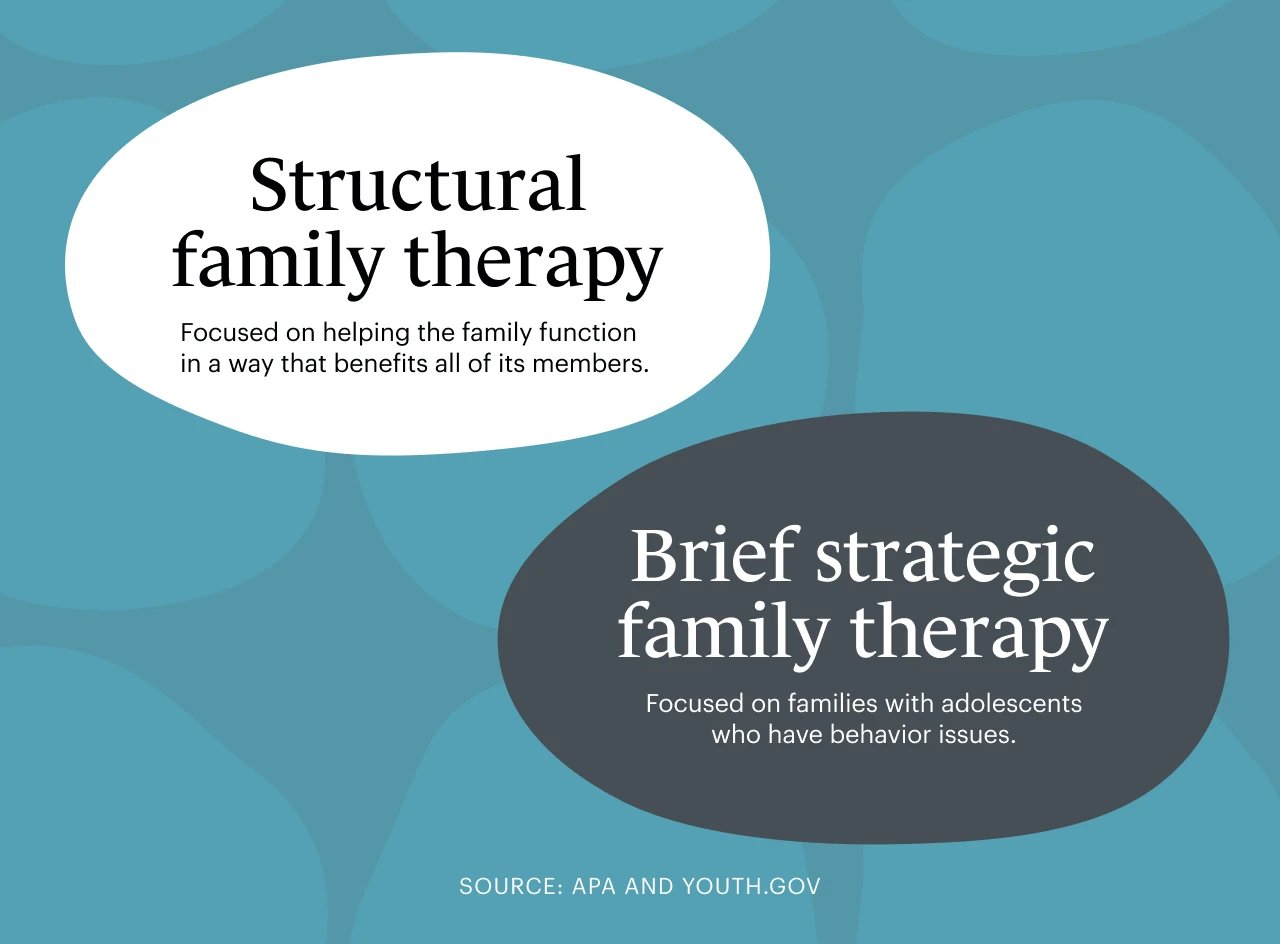
How does family therapy work?
Family counseling is conducted by a licensed marriage and family therapist (LMFT).
LMFTs have received a master’s degree and specialized training in marriage and family therapy, focusing on individual and group diagnosis and counseling.
You can expect an average of 12 family therapy sessions with the goal of having an “end in mind” for treatment, according to AAMFT.
Caldwell says sessions can vary from week-to-week depending on prior sessions or events that occurred following the previous meeting with a therapist.
For example, sometimes a large group may be present, while other times it just may be an individual or even a smaller group within the family.
“Unlike individual therapy, family counseling has to move and change with the natural ebbs and flows of daily life,” explains Caldwell.
You can expect an average of 12 family therapy sessions with the goal of having an “end in mind” for treatment.
“That said, family therapists like to work with as many people as possible for most of the therapy, because isolating members for too long defeats the purpose of family therapy,” she says, “Which is to bring members together under a cohesive set of rules and expectations—even those who appear to be ‘outside’ of the presenting problem.”
There are two main types of family therapy: structural family therapy and brief strategic family therapy.
In structural family therapy, the focus is to help the family function in a way that benefits all of its members. Structural family therapy often employs the tactic of acting out specific scenarios or conversations in order for individuals in the family to better understand each other.
Brief strategic family therapy, on the other hand, focuses on families with adolescents who have behavior issues.
Again, the family is seen as a unit, and according to researchers, the goal “is to change the patterns of family interactions that allow or encourage problematic adolescent behavior.”
Since brief strategic family therapy does employ some methods of structural family therapy, a combination of the two methods is possible in a therapeutic setting.
How do I find a family counselor and family therapy near me?
The Monarch Directory by SimplePractice can help you find a family therapist.

You can browse family therapists who take insurance—many who offer free consultations and are even available nights and weekends—so you can find the perfect fit for your family’s needs.
READ NEXT: How to Prepare for Your First Therapy Session
Need to find a therapist near you? Check out the Monarch Directory by SimplePractice to find licensed mental health therapists with availability and online booking.





